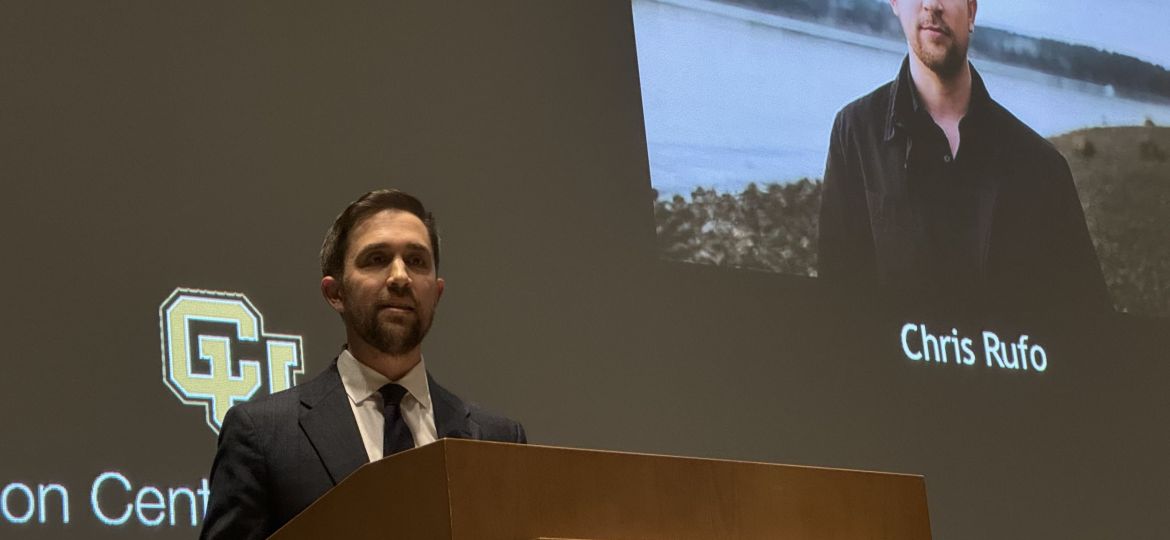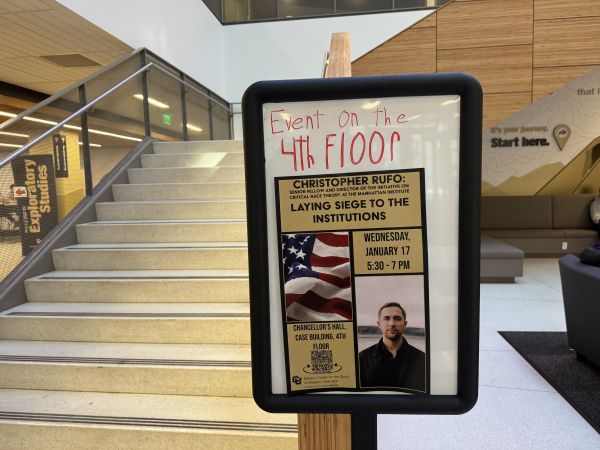
Conservative Activist Chris Rufo Tells CU Boulder Audience to Lay Siege to Institutions
Conservative activist Chris Rufo told an audience of CU Boulder community members that diversity should be a secondary goal of higher education. The lecture echoed his efforts to eliminate critical race theory and diversity initiatives on college campuses nationwide.
Rufo, who was vital in ousting former Harvard President Claudine Gay earlier this year, was invited and paid to speak by the Bruce D. Benson Center for the Study of Western Civilization.
“(Diversity, equity and inclusion), in practice, imposes an ideological orthodoxy on faculty and students that undermines the pursuit of truth,” Rufo told the 170-strong crowd, including two University of Colorado Regents, on Wednesday, Jan. 17.
Five officers from the university police department provided security for the talk. One officer said these measures were typical for political events of this size.
Rufo’s talk, titled “Laying Siege to the Institutions,” is a variant of one he’s been giving since 2022. He encouraged attendees to push for legislation restricting public universities from operating social equity programs. Those programs include gender or ethnic studies departments; diversity, equity and inclusion (DEI) offices and critical race theory in academic curriculum.

“Without active DEI measures contributing to representation, accessibility and inclusion, it can leave underrepresented students feeling isolated and unsupported, which can affect retention rates and overall student wellbeing,” said Nimisha Mallela, CU Boulder student government’s director of diversity, equity and inclusion, in a statement.
Rufo took swings at several trainings and classes he said CU Boulder has promoted or published, which addressed “white supremacy culture” and graduation ceremonies held specifically for marginalized students.
“DEI suppresses the freedom of speech and inquiry by policing not only thought, not only speech, not only behavior but oftentimes even unconscious expressions,” Rufo said.
Sitting in the front row, University of Colorado Regent Wanda James said she found the event distasteful and inaccurate.
“These are the rantings of not a very educated man on the subject of diversity,” James said after the event. “I was less impressed with his academic premise than I was expecting … I could have probably argued against DEI better than he did.”
CU Regent Mark VanDriel said he felt mixed about the event but was interested in some of what Rufo had to say.
“There are some things I really liked about where we are, and I think he has some ideas that could be really interesting,” VanDriel said.
VanDriel said he felt the university’s implementation of DEI efforts could be more transparent, something he took away from Rufo’s comments about CU Boulder’s policies.
‘Vision into concrete policy’
Chris Rufo’s public campaigns against diversity initiatives in education, whose goals are laid out plainly on Twitter and in interviews with Politico, have drawn condemnation from the left and admiration from the right.
He’s publicly outlined his strategy online to create easily identifiable cultural issues that demonize academic institutions, making issues like critical race theory untenable for voters.
“Rufo is publicly doling out right-wing rationales for policymakers to dismantle educational institutions,” said Lauren Lassabe Shepherd, a historian at the University of New Orleans and author of “Resistance from the Right: Conservatives and the Campus Wars,” in a statement.
This strategy has launched him to the forefront of conservative activism. He landed a distinguished fellowship at Hillsdale College, became a trustee of the formerly progressive New College in Florida and writes for the Manhattan Institute, a conservative think-tank.
Since delivering the first version of “Laying Siege to the Institutions” at Hillsdale, Rufo said he’s made a lot of progress in advancing his vision of American academia.
“In the last year and a half, I’ve worked with governors, legislators … to translate that vision into concrete policy, and we’ve already started to significantly reform institutions,” he said in an interview.
Shepherd said large public academic institutions could be impacted by Rufo’s efforts.
“While Rufo has tended to target particularly unique institutions … it’s actually larger state public (universities) like CU that are the most vulnerable to the right’s attacks on higher ed,” Shepherd said. “State colleges are heavily dependent on state funding, especially those without major football or basketball programs and thus a reliable donor base.”
Seth Cotlar, a professor of history at Willamette University in Oregon, said Rufo’s arguments — while effective — are deeply flawed and aren’t argued in good faith.
“He is a specialist in producing moral panics,” Cotlar said. “That is his expertise, and he is quite good at it.”
Most recently, Rufo helped lead the effort to remove Claudine Gay from her position as president of Harvard University. Gay’s critics said she failed to condemn antisemitic speech forcefully enough in congressional testimony, and Rufo alleged she plagiarized several passages in work she published throughout her career.
What followed was a weeks-long pressure campaign from Rufo, major donors to Harvard and internal actors in the university — according to Rufo — which resulted in Gay’s resignation on Jan. 2 this year.
Rufo maintains Gay, who was Harvard’s first Black president, obtained her position in part because of diversity initiatives and was less qualified than previous university presidents.
‘A different perspective’
Professor Daniel Jacobson, the director of the Benson Center, did not say how much the center paid Rufo for Wednesday’s lecture. However, he said the funds to pay Rufo came from gifts and grants specifically dedicated to the center.
“Christopher Rufo is one of the most important figures in the current debate over the use of Critical Race Theory and DEI in academia,” Jacobson said in a statement. “His challenge to those controversial ideas and practices deserves to be heard on campus, regardless of whether one agrees with it, and his lecture promises to bring a different perspective to these issues than is commonly heard at CU.”
The center, founded by a former CU system president about a decade ago, is far more conservative than the rest of campus and has invited controversial figures to give guest lectures in the past.
Rufo praised the Benson Center in an interview, calling it “critically important.”
“The same ideologues who have ruling hegemony over the institution as a whole cannot seem to tolerate a minuscule numerical minority of scholars that disagree with them,” he said.
The Benson Center attracted widespread attention when John Eastman, who was the center’s visiting scholar in conservative thought and policy, spoke at a rally held just before the Jan. 6 riot at the U.S. Capitol. Eastman helped former President Trump challenge the results of the 2020 election and was recently indicted by prosecutors in Georgia for alleged racketeering to overturn that election.
Brandon Warmke is the newest visiting scholar in conservative thought and policy, the position Eastman once held. He moderated Wednesday’s event.
“A university can fulfill its mission only when it welcomes conversations about a diversity of ideas,” Warmke said. “The Benson Center is proud to contribute to those conversations.”

